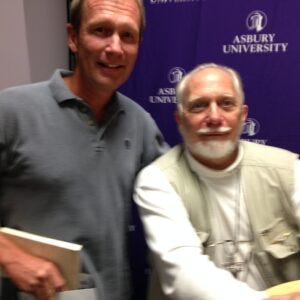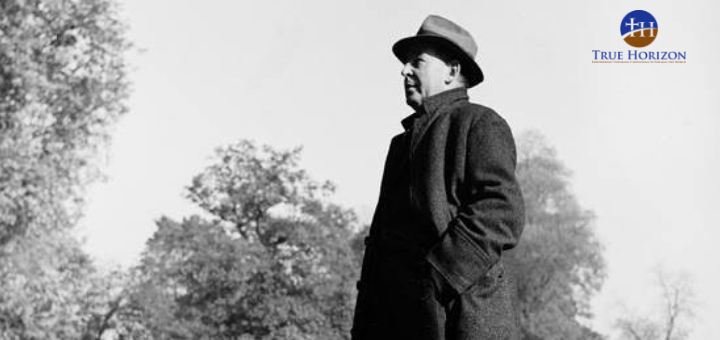Remembering Jack
Anyone who was alive 60 years ago this past week probably remembers where they were and what they were doing on the morning of November 22, 1963. It’s a day that is emblazoned in our minds because it was the day that one of the greatest and most influential men in modern history died. Sadly, I didn’t learn the significance of that day until nearly 30 years later. I’m still learning how much that man influenced my life and how indebted I am to his life’s work.
His friends called him Jack, but the man I’m talking about is not the man that you probably associate with November 22, 1963.
The Jack I’m talking about’s full name was Clive Staples Lewis.
An Enormous Impact
On the first day of classes in my Master’s Degree program at Biola University, Craig Hazen welcomed us to the campus and asked us to go around the room for an introduction. He wanted us to include a short explanation of how and why we became interested enough in Christian Apologetics to enroll in the program we were just beginning. As I recall, there were about 28 of us in the room. Twenty-five of us (me included) invoked the name of C. S. Lewis. He is the modern grandfather of Christian Apologetics.
Many of us idolized Lewis for his wit, intellect, and ability to make a point in a way that no one else could. This wasn’t an unhealthy form of idolatry. Jack Lewis would reject and admonish the very thought of such a thing. It is simple respect and gratitude for the memory of a great man and the enormous impact he continues to have on this world.
Still Relevant
Lewis’s books are still being published. His allegorical stories and novels are still being made into films. Max Mclean has made himself deservedly famous for his one-man-show theatrical presentations of Lewis’s works. And he’s done so simply by doing dramatic recitals of Lewis’s books. Masterpieces like The Screwtape Letters and The Great Divorce.
Think about that.
We live in the age of instant news, YouTube videos, and TikTok. Max Mclean is reciting 80-year-old C. S. Lewis books … and his audiences are mesmerized by them.
It is hard for me to imagine that one person outside the biblical authors could ever again have as much influence on the way so many people think. No one I know of can defend and promote the truth and reality of Christianity as well as C. S. Lewis. His way with words, the depth of his thoughts, and the prescience with which he anticipated the world we now inhabit is breathtaking to comprehend. He was a master of language. And he was a brilliant observer of human nature and culture.
Connecting With Regular Folks
C. S. Lewis was not a philosopher. He was something better. Lewis was someone who could make philosophy real. He could see where philosophy was heading. His predictions and philosophical forecasts from the 1940s and 1950s have become today’s headlines. If you’re skeptical of that claim, don’t take my word for it. Just sit down for a couple of hours and read The Abolition of Man. Then, try to fathom the fact that it was first published in 1947.
C. S. Lewis was a model for both Christian believers and rationalistic skeptics. His talent went beyond his remarkable ability to make Christianity relevant. He challenged anyone who has stopped thinking about life’s most important questions, especially those who think they’ve already found all the answers. He grew up an atheist. But he later admitted that his atheism was motivated by the emotional consequences of the pain he experienced in his youth. He couldn’t reconcile his experience with a good and loving God.
That is a difficult thing to overcome. It is the most common reason for rejecting belief in God’s existence. It is the enemy of reason. But as he contemplated his complaint, reason vanquished his skepticism.
“My argument against God was that the universe seemed so cruel and unjust. But how had I got this idea of just and unjust? A man does not call a line crooked unless he has some idea of a straight line.” ~ C. S. Lewis, Mere Christianity
Jack Lewis was more committed to the rational pursuit of truth than to his feelings. He refused to remain a victim of the tendency to let emotion succeed in locking the door behind a closed mind.
A Challenging Childhood
Lewis’s mother died when he was 8 years old. Shortly thereafter, his father shipped him and his brother off to boarding school. There, he gained not only a superior education but also a love for books and inner reflection. Both were born of loneliness. Many of Lewis’s childhood memories shaped the characters he would later create. His vivid pictures of those times became the settings for his stories. He relished the influences of George McDonald and G. K. Chesterton. They made him a lover of stories and challenged him to think for himself.
He fought in World War I, was wounded, and had one of his dearest friends, Paddy Moore, die in that war. But he had made a pact with Paddy. And, because he was an honorable man, he stood by that pact. On his return to England, Lewis spent the next 32 years caring for Paddy’s mother. That enterprise was both strenuous and stressful. But for the rest of his life, Lewis rarely mentioned it.
Surprised By Joy
This was a man who had every excuse to be bitter and angry. But everyone who knew him thought him to be the most cheerful and joy-filled person they had ever met. Lewis rejected bitterness and emptiness. Instead, he turned toward the Truth and the power of Christ.
In his autobiographical and ironically titled, Surprised By Joy, Lewis describes his arrival at Oxford. He had an idyllic picture in his mind about the place that would become his academic home and anchor. When he got off the train, he meandered through town looking for a place to stay. As he wandered, the town “became more and more shabby, with one dingy shop after another. [But he continued], always expecting the next turn to reveal [its] beauties.”
Only when it became obvious that he was coming to open country and there was no town left did Jack stop and turn around. Then he saw, “[Oxford] in all its glory, with its grand collection of towers and spires reaching toward the sky, a picture of academic splendor unsurpassed anywhere in the world.”*
He had been walking in the wrong direction. But turning around, he saw glory straining up above the shabby world in which he wandered.
“I did not see to what extent this little adventure was an allegory of my whole life.” ~ C.S. Lewis, Surprised by Joy
Getting Close
 Several years ago, I got as close as I could ever get to meeting Jack Lewis. His stepson, Douglas Gresham, and Dr. Devin Brown of Asbury University visited a nearby church to spend a couple of hours telling stories about him. Dr. Brown had recently published his book, A Life Observed: A Spiritual Biography of C.S. Lewis. It’s a book that any skeptic or any fan of Christianity should read because Lewis was both of those. I wish we would all be as dedicated and insistent about pursuing the truth as he was.
Several years ago, I got as close as I could ever get to meeting Jack Lewis. His stepson, Douglas Gresham, and Dr. Devin Brown of Asbury University visited a nearby church to spend a couple of hours telling stories about him. Dr. Brown had recently published his book, A Life Observed: A Spiritual Biography of C.S. Lewis. It’s a book that any skeptic or any fan of Christianity should read because Lewis was both of those. I wish we would all be as dedicated and insistent about pursuing the truth as he was.
Notoriety -vs- Significance
If Jack Lewis shared on Instagram every picture of himself that exists in the world, there would only be 38 posts.** Yet, in an age where sound bites and celebrity count for more than substance, his work still resonates with and touches those who are privileged enough to read it.
Today, I take exception with some of the views he championed during his life. But there is no mere Christian who has made me think more about our shared convictions than Jack Lewis. I look forward to the day when I get off the bus at heaven’s gates. I don’t think I’ll have to look far to see a figure I barely recognize but who seems somehow more imposing than most of the others. Certainly, more than all the familiar faces for whom notoriety was their only earthly goal. When I do, I’ll remember his words from The Great Divorce. It’s the scene when the traveler’s guide/teacher assures his student that:
“[He] is one of the great ones. Ye have heard that fame in this country and fame on Earth are two quite different things … Redeemed humanity is still young, it has hardly come to its full strength. But already there is joy enough in the little finger of a great saint such as yonder [gentleman] to waken all the dead things of the universe into life.” ~ C. S. Lewis, The Great Divorce
I look forward to shaking his hand and thanking him for the wisdom and clarity he brought to so many mere humans.
*Devin Brown, A Life Observed, p. 97.
**According to The Magic Never Ends documentarian Chip Duncan as cited in: Devin Brown, A Life Observed, p. 18.






